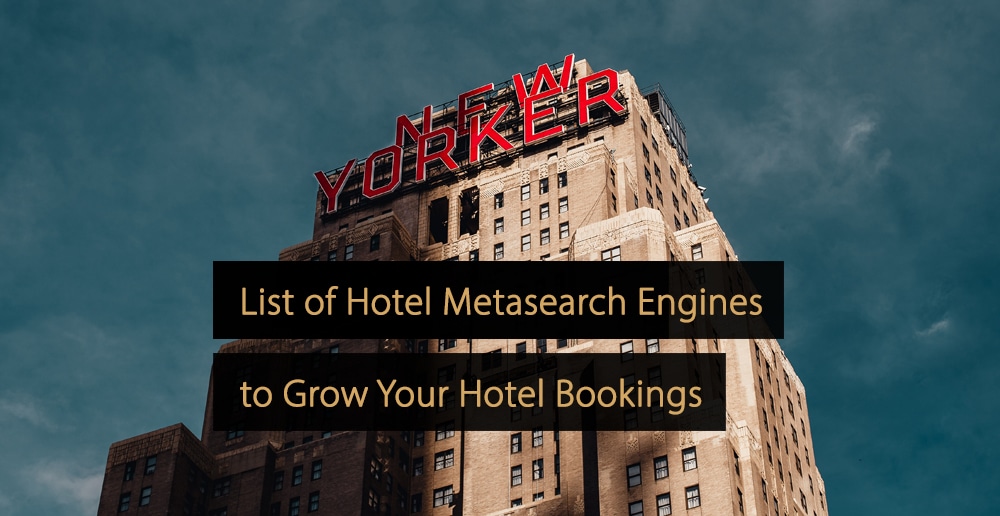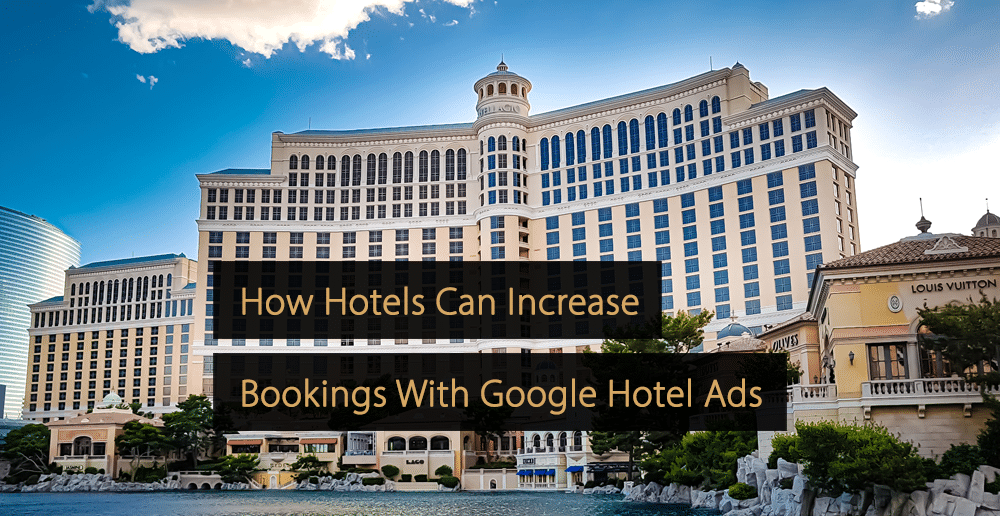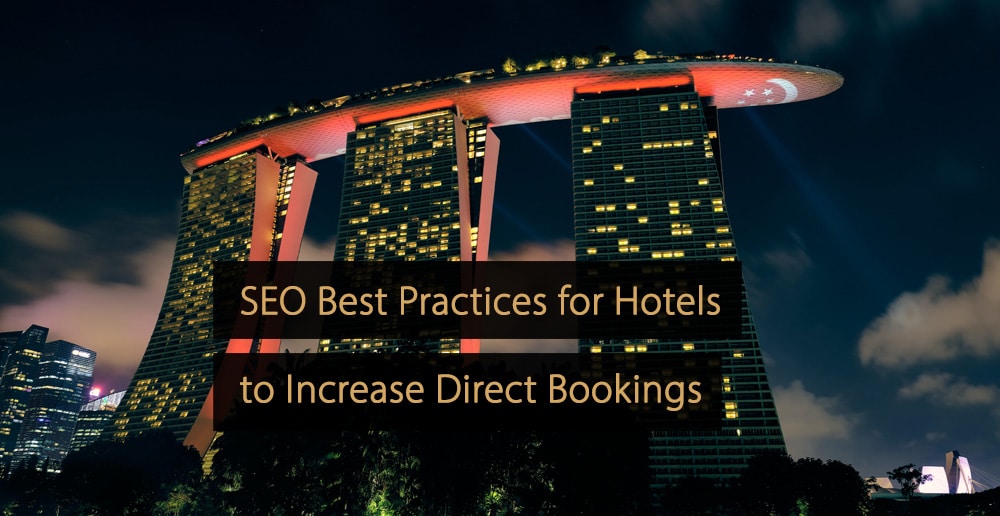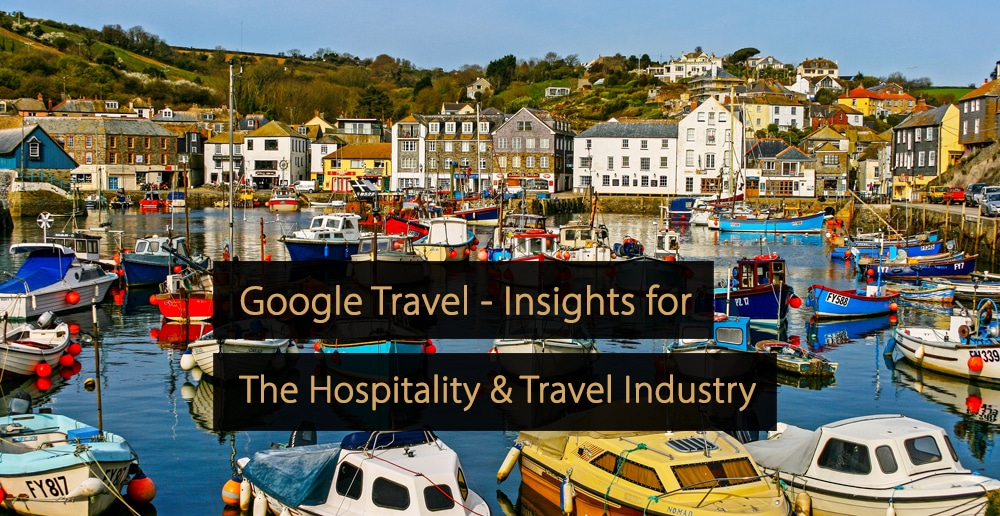Hotel metasearch engines provide an excellent opportunity for those in the hotel industry to reach more customers. This is because many potential guests turn to these platforms for price comparison purposes before making a booking. In this article, you will find out more about these platforms, along with a list of some of the most popular hotel metasearch engines you should connect with to boost your bookings.
Table of Contents:
- What are Hotel Metasearch Engines?
- What is the Difference Between Hotel Metasearch Engines and OTAs?
- List of Hotel Metasearch Engines to Boost Your Hotels Bookings
- How to Connect Your Hotel to A Hotel Metasearch Engine?
- How Can I Promote My Property on Hotel Metasearch Engines?
- Tips to Increase Bookings Through Hotel Metasearch Engines
- List of Online Travel Agents to Increase Your Hotel Bookings
- The Most Important Distribution Channel for Your Hotel
- More Distribution Tips to Optimize Revenue
What are Hotel Metasearch Engines?
A metasearch engine is an online search tool that draws its results from several other search engines and produces its own combined results list. Hotel metasearch engines function as rate-shopper platforms, allowing users to view an aggregated list of hotel roommates, drawing from online travel agents and web search platforms.
This allows users to see room availability and the rates offered on different platforms, all from a single list. For customers, this makes it easier to book a hotel room for the lowest price, while for hotels, it represents another important online distribution channel, alongside OTAs and your own hotel website.
What is the Difference Between Hotel Metasearch Engines and OTAs?
There remains significant confusion within the hotel industry about how hotel metasearch engines differ from online travel agents. Despite this, the two concepts are distinct. In simple terms, OTAs sell products, services, or inventory on behalf of providers. Examples of providers include hotels, airlines, car rental companies, and similar businesses.
The OTA will charge the provider a commission fee in exchange for completing the sale. Hotels use OTAs to expand their reach, and the commission is considered a price worth paying for the extra demand. Hotels may connect with the OTA directly or via one of the global distribution systems the OTA uses to make its bookings.
By contrast, metasearch engines draw results from other search engines, such as OTAs, and present the information in one place. Customers cannot typically book directly from the metasearch engine because they do not usually sell inventory. Instead, customers click through to an OTA or other platform and book their room there.
There are a variety of ways hotel metasearch engines make money. For example, some receive a percentage of an OTA’s commission when a sale is made, while others sell advertising space on a cost-per-click basis.
List of Hotel Metasearch Engines to Boost Your Hotels Bookings
There are a number of hotel metasearch engines that your hotel can connect with in order to expand your reach and boost your hotel bookings. Below, you will find seven of the most significant and popular examples.
–
Google Hotel Ads launched in 2011 under the name Google Hotel Finder and is integrated with the wider Google search engine. As a result, hotel ads – complete with price comparisons from different OTAs – feature within relevant Google search results pages and while using Google Maps. For many people, Google is the default starting point when searching for travel products, so it is a key hotel metasearch engine that generates huge traffic.
Click here for more information about Google Hotel ads.
Founded in Düsseldorf, Germany, in 2005, Trivago is owned by Expedia Group and operates in more than 50 different global markets. The platform serves as a hotel price comparison website and is one of the largest hotel metasearch engines in the world, offering comparisons from more than a million hotels and over 250 different global booking platforms. The company makes money by selling CPC advertising space to hoteliers and hotel booking platforms.
Click here for more information about Trivago.
TripAdvisor was founded in 2000 and has its headquarters in Massachusetts in the United States. It started life as a travel review website and still functions in this way, but it has also emerged as a metasearch engine too, covering a variety of different travel products, including hotels. This means customers can easily check reviews and compare prices on the platform. Again, much of its income is generated through offering cost-per-click advertising space.
Click here for more information about Tripadvisor.
Kayak is a metasearch engine that is available in more than 30 countries. The website launched in 2005 and was purchased by Booking Holdings – the parent company of Booking.com – back in 2013. It is able to display results for more than 2 million properties, drawing its results from hundreds of third-party websites and platforms. Kayak is also notable for its review feature, ensuring users only see genuine reviews from verified hotel guests.
Click here for more information about Kayak.
Another subsidiary of Booking Holdings, HotelsCombined, is based in Sydney, Australia, and aggregates room rates and review scores from various online platforms, including the main online travel agents. It is also especially well-known for its reach. In fact, HotelsCombined is currently available in more than 200 countries and 40 different languages. A hotelier program also allows those in the industry to manage and keep their listing page updated.
Click here for more information about HotelsCombined.
Wego was initially launched in 2005 and is based in Singapore. It currently supports users in more than 50 countries, although its core markets are Asia Pacific, the Middle East, and India. Results are generated by searching OTAs like Booking.com, Priceline, Agoda, Trip.com, and platforms like Airbnb and Hostelworld. However, in addition, those in the hospitality industry can also keep their own property listing updated.
Click here for more information about Wego.
Skyscanner is owned by the Trip.com Group, and is based in Edinburgh, Scotland. The company was founded in 2003 and, as the name suggests, it began as a metasearch engine for comparing flight prices. However, it has since expanded to include other price comparisons too. The SkyScanner Hotels service was launched in 2014, and hotels can connect to the service directly or via GDS systems, central reservation systems, or channel managers.
Click here for more information about Skyscanner.
How to Connect Your Hotel to A Hotel Metasearch Engine?
For your hotel to show up in results pages generated by hotel metasearch engines, you will need to connect your hotel to online travel agents like Booking.com, Priceline, and Expedia. However, due to the way OTAs optimize and provide information to metasearch engines, it is important to connect to multiple OTAs and prioritize those in your local market and key markets you are looking to target. Doing so will maximize your chances of showing up in results.
On top of this, some metasearch engines allow you to create a profile for your hotel, continuously manage its content, and use services like direct advertisements and performance monitoring. Many platforms will also allow you to connect directly to exchange room rates and availability information.
How Can I Promote My Property on Hotel Metasearch Engines?
When it comes to promoting your property, there are different options available, and individual metasearch engines differ in their approach. The three main options are as follows:
1. Advertising Models
In the vast majority of cases, hotel metasearch campaigns that operate through an advertising model will be paid for on a cost-per-click basis. This means that the metasearch engine displays your hotel advertisement when relevant search queries are made, and users then click on the advertisement to go to your website.
The key advantage of this approach is that you only pay when the advertisement is clicked, meaning you are not charged when the advert is displayed but fails to attract interest. However, it is important to set the right prices to achieve a high conversion rate, or else you risk paying for ad clicks that do not actually generate sales.
2. Commission-Based Models
With a commission-based metasearch campaign, your hotel does not pay for advertising space, but instead pays a commission fee on room sales that are generated through hotel metasearch engines. Simply put, this means paying metasearch engines a percentage of the money the customer pays to complete their booking.
The precise percentage that hotels must pay varies from platform to platform. The main advantage of this approach is the fact that it is effectively risk-free, as you will only pay for successful sales. However, one potential disadvantage is that hotel metasearch engines may base your visibility on the ROI you generate.
3. Combination Models
Combination models function as a hybrid between the two approaches, with elements of commission-based payment and cost-per-click bidding. For a hotel, this model can help avoid the visibility problem associated with a pure commission-based model, especially if you run a smaller hotel.
The cost-per-click nature of the advertising encourages hotel metasearch engines to provide advertising space. However, the downside is that there is still an element of risk associated with the model, as your hotel will pay for clicks, regardless of whether or not they eventually result in a customer booking a room.
Tips to Increase Bookings Through Hotel Metasearch Engines
Now that you have an understanding of how metasearch engines can help those in the hotel industry, along with a list of some of the most popular hotel metasearch engines to try to work with, it is important that you also take some strategic steps to ensure your efforts are actually successful.
In the article “Tips to Increase Bookings Through Hotel Metasearch”, you will find some specific tips that can assist you with the task of using metasearch engines to generate more bookings.
List of Online Travel Agents to Increase Your Hotel Bookings
While hotel metasearch engines represent an excellent opportunity to reach a wider audience, the full benefits of this distribution channel can only be fully realized if your hotel connects with the right online travel agents, providing you access to customers in your key target markets.
In the article “Online Travel Agents to Increase Your Hotel Bookings”, you will be able to find out more about the value of OTAs and explore a list of some of the most popular OTAs for hotels to connect to.
The Most Important Distribution Channel for Your Hotel
While both metasearch engines and online travel agents present valuable opportunities for hotels to reach a wider customer base, it is necessary to understand that bookings generated through these channels will require your hotel to pay somewhere along the line, whether it is for advertising space, or a commission on the booking itself.
By comparison, bookings that customers make via your own hotel website are not subject to this same requirement to pay out. Instead, you will keep all of the money generated from the booking, which can boost your overall revenue results. Therefore, from a hotel management perspective, this is the most important distribution channel, and you should try to take action to generate more direct bookings from your own website.
In the article “Tips To Gain More Bookings With Your Hotel Website”, you will learn how to increase direct bookings with your hotel website.
Many modern travelers turn to price comparison platforms in order to find the best room rates in their chosen destinations. By connecting with the hotel metasearch engines listed in this article, you can increase your chances of reaching these customers and boosting the number of hotel bookings you generate.
- List of Corporate Travel Agents for Hotels to Gain More Business Travelers
- Global Distribution System (GDS): What Are the Benefits for Hotels?
- Hotel Advertisement; 10 Effective Hotel Advertising Strategies
- Hotel Distribution Channel Manager: What Are the Advantages?
- Hotel Marketing; The Latest Trends in the Hotel Industry
More Tips to Grow Your Business
Revfine.com is the leading knowledge platform for the hospitality and travel industry. Professionals use our insights, strategies, and actionable tips to get inspired, optimize revenue, innovate processes, and improve customer experience.Explore expert advice on management, marketing, revenue management, operations, software, and technology in our dedicated Hotel, Hospitality, and Travel & Tourism categories.
This article is written by:
Hi, I am Martijn Barten, founder of Revfine.com. With 20 years of experience in the hospitality industry, I specialize in optimizing revenue by combining revenue management with marketing strategies. I have successfully developed, implemented, and managed revenue management and marketing strategies for individual properties and multi-property portfolios.











Leave A Comment